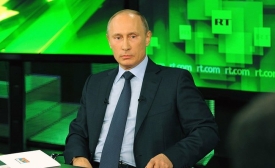information warfare

Philip Seib on Russia and disinformation.
In early June, the Czech daily Hospodářské Noviny was first to report the European Union was forming “a special group to fight Russian propaganda.” Based in Brussels, the group will include experienced journalists and press officers who are fluent in Russian. It is charged with promoting the EU more effectively and strengthening its media presence, with special attention to Russian-language media.
The idea of Russian “soft power” became fashionable, but it was very different to European “soft power”. So-called Russian soft power was just “softer power”, including any means of coercion not involving tanks. It was, in the English phrase, “softly-softly” power, or “covert power”, the type of behind-the-scenes influence encapsulated in the Russian phrase kuluarna polityka – politics in corridors, not just away from public influence, but without formal record.
Russia also has ramped up its advances on the information warfare front, aiming a barrage of propaganda at foreigners, particularly at Russian speakers living in its “near abroad.”
To put it simply, information warfare is a blend of psychological operations (“psyops”) and electronic warfare (“EW”). (...)Whatever the process, information warfare is an essential requirement for strategic projection of soft power, to achieve specific national agenda and objectives.
The US State Department's Center for Strategic Counterterrorism Communications (CSCC) is conducting public diplomacy, not information warfare against the Islamic State (IS) and other terrorist organizations by contesting the space of digital communication and challenging extremist propaganda, the CSCC coordinator told RIA Novosti on Tuesday.







